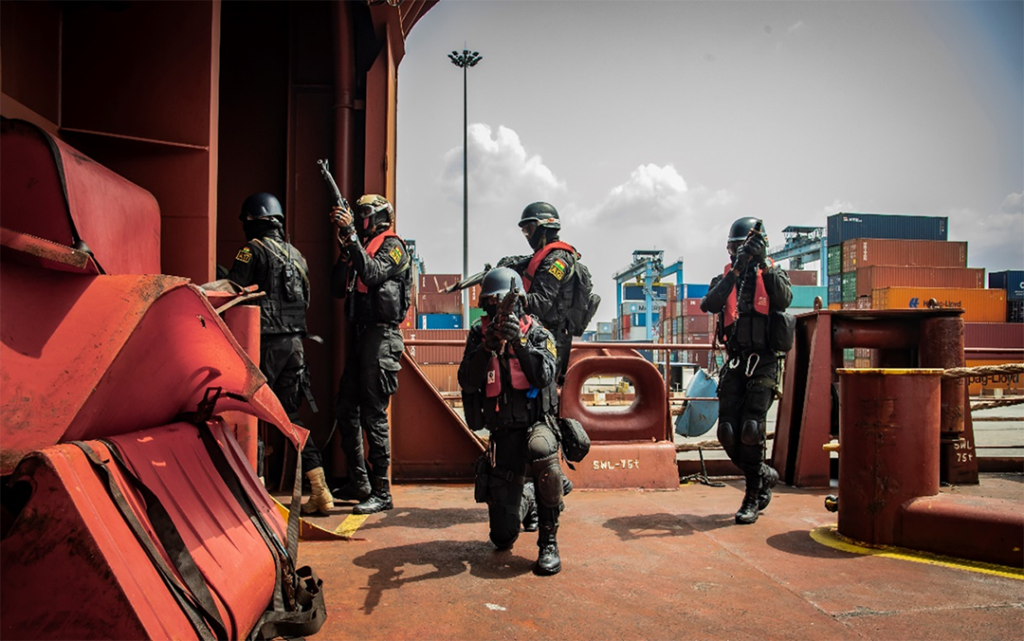ADF STAFF
As a Ghanaian Air Force helicopter thundered overhead, members of the Ghana Navy Special Boat Squadron (SBS) rappelled down to the deck of a ship floating just offshore. With weapons drawn, they began searching the ship for suspected pirates.
The assault was a drill — part of annual training exercises for SBS members in partnership with U.S. and Danish militaries. The assault drill and others, such as close-quarter combat and emergency medical training, are designed to strengthen Ghana’s marine security, build its ability to defend its territorial waters and coordinate more closely with its neighbors.
“The tripartite collaboration between U.S., Denmark and Ghana has tremendously improved the capacity of the Ghana Navy SBS mainly in providing swift and effective response to maritime security incidents in Ghana’s coastal waters,” Ghana Navy Lt. Cdr. Seth Anthony Dzakpasu told ADF.
Ghana sits in the heart of the world’s worst region for piracy. Pirates in the Gulf of Guinea have become notorious for attacking ships and taking crews hostage.
However, investments in marine security by Ghana and other countries along the Gulf appear to be making headway against criminals. After accounting for 43% of global piracy in the first three months of 2021, the Gulf of Guinea accounted for less than 20% during the same period this year, according to the International Maritime Bureau (IMB)’s quarterly piracy and armed robbery report.
“Sustained efforts are however needed to ensure the continued safety of seafarers in the West African region that remains dangerous,” the IMB said in a statement earlier this year.
The IMB pointed to the hijacking of a tanker off the coast of Côte d’Ivoire on January 24 when 17 crew members were taken hostage, along with reports of armed robberies in the near-shore waters of Angola and Ghana as evidence that more work remains to be done. In early April, pirates boarded the bulk carrier Arch Gabriel 260 nautical miles off Ghana’s coast.
In December 2021, Ghanaian Vice President Mahamudu Bawumia told graduates of the Ghana Military Academy and Training School that the government planned to equip the nation’s Navy with offshore patrol vessels and fast patrol boats as part of a larger investment in Ghana’s military capacity.
The SBS started in 2016 with the help of Nigerian Special Forces. Today, it operates a variety of vessels, including fast patrol crafts, within Ghana’s 200 nautical mile exclusive economic zone. It also works with Ghana’s Air Force, as it did during the recent training mission, to insert troops quickly when necessary, Dzakpasu said.
Training missions such as the Joint Combined Exchange Program with the U.S. and Denmark have helped advance the capacity of Ghana’s developing SBS force, Dzakpasu said.
The collaboration not only has enabled the SBS to learn best practices from the special operations force community, he added, but it has enabled the SBS to refine its training with the experience of the Danish Navy’s Frogman Corps special forces and U.S. partners.
“In all, the operational readiness of the SBS has greatly improved in just about one year of this training collaboration,” Dzakpasu said.
Through its partnership with the U.S. and Denmark, the Ghana Navy SBS has better capacity and greater efficiency to conduct anti-piracy operations, counterterrorism work, coastal reconnaissance and can safeguard strategic maritime infrastructure, Dzakpasu said.
By working closely with Nigeria and its other neighbors, Ghana can project more authority in the waters off the shared coast, particularly when crimes cross international boundaries.
“This gives us in the Gulf of Guinea a robust posture to fight maritime crimes,” Dzakpasu said.

